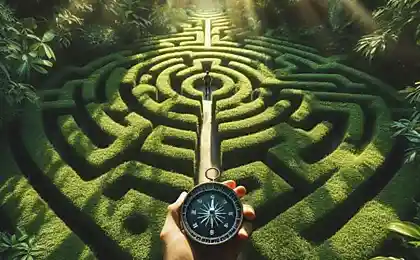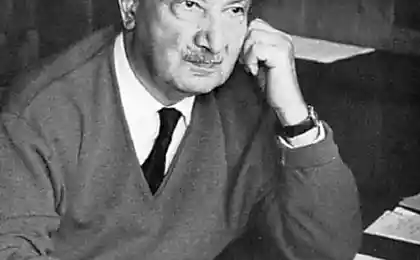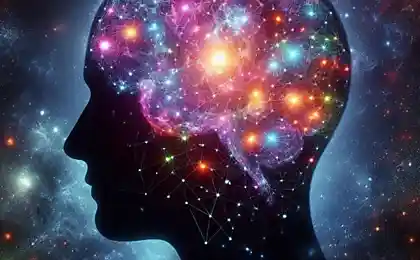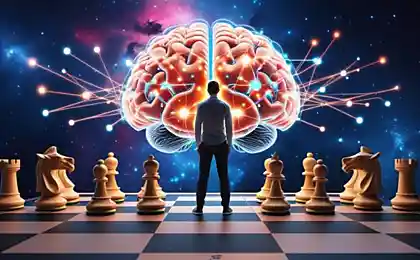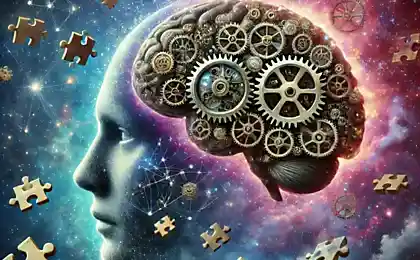734
Robert Paul Lanza: Life is an adventure that transcends our ordinary linear thinking
Ninety two million three hundred fifty five thousand three hundred seventy seven
Professor of medicine Robert Paul Lanza, known for his research in the field of stem cell research and cloning, is also the Creator of the new scientific theory of biocentrism. One of his articles on this subject we offer.
After the death of his old friend, albert Einstein said, "Besso left this strange world a little ahead of me. It doesn't mean anything. People like we, know that the distinction between past, present and future is only a stubborn obsessive illusion".
The new data also confirm that Einstein was right: death is an illusion.
Our classical way of thinking is based on the belief that the world has an objective existence independent of the observer. But a lot of experiments shows that just the opposite. We believe that life is just the activity of carbon and a complex mixture of molecules: some time we live in, and then rot in the ground.
We believe in death because we have been taught that we die. In addition, of course, because we associate ourselves with our body, and we know that bodies die. End of history. But biocentrism, a new theory concerning of all, tells us that death may not be the terminal event we think. Surprisingly, if you add life and consciousness to the equation, you can explain some of the biggest mysteries of science. For example, it becomes clear why space and time — and even the properties of matter itself — depend on the observer. Also it becomes clear why the laws, forces and constants of the universe seem perfectly matched for the existence of life.
Until we recognize the universe in our heads, attempts to understand reality will remain a road to nowhere. Take a look at the weather outside: you can see the blue sky, but the cells of your brain can be changed so that the sky would be green or red. In fact, using genetic engineering we could make it so that all the red will vibrate or make a noise or even call you sexual desire, as occurs in some birds. You think that now light, but your brain currents can be changed so that you will see twilight. You think that now it is hot and humid, but tropical frogs the weather seems cool and dry. This logic applies to almost everything. The result: what you see may not be present without your consciousness.
In truth, you can't see anything through the bone that surrounds your brain. Your eyes are not portals to the world. Everything you see and experience right now, even your body is a whirl of information occurring in your mind. According to biocentrism, space and time are not the hard, cold objects we think. Flutter your hand in the air: if you remove all that will remain? Nothing. The same applies to time. Space and time are simply tools for all.
Consider the famous double-slit experiment. When scientists observe the passage of particles through two slits in a barrier, the particle behaves like a bullet and goes through one slit or through the other. But if you don't watch, it acts like a wave and can go through both slits at the same time. So, how can a particle change its behavior depending on, see you on it or not? The answer is simple: reality is a process that involves your consciousness.
Or, for example, take the famous Heisenberg's uncertainty principle. If there is indeed a world outside, where the particles randomly jump, we should be able to measure all their properties. But we can't. For example, the exact position and momentum of a particle cannot be known at the same time. So why the particles should have a value that you have decided to do the measurements? And as a pair of "quantum entangled", i.e. having a common origin, particles can instantly communicate with each other from opposite ends of the galaxy as if space and time do not exist? Again, the answer is simple: because they're not just "outside" space and time are tools of our mind.
There is no death in the timeless, spaceless world. Immortality does not mean an infinite existence in time but is outside time altogether.
Our linear way of thinking about time is also inconsistent with another series of recent experiments. In 2002, scientists showed that particles of light, photons knew in advance what their distant twins would do in the future. They tested the communication between pairs of photons. They were interrupted by the movement of a single photon, and he had to decide whether it will be a wave or a particle. The researchers increased the distance that was required by another photon to reach your detector. They could have put in his path polarizer, in order to prevent its transformation into a particle. Somehow, the first particle knew what the researcher was going to do, before it happened, in the distance, instantly, as if there was no space or time between them. She decided not to become a particle even before her twin met the polarizer. No matter how we conduct the experiment. Our mind and its knowledge is the only thing that determines how particles behave. Experiments consistently confirm the effect depends on the observer.
Surprisingly? Consider another experiment that was recently published in the prestigious scientific journal "Science". Scientists in France, directing the photons into the apparatus, showed that their actions could retroactively change something that had already happened in the past. When the photons reached the branching device, they had to decide whether to behave like particles or like waves when hitting the beam splitter. Later, after the photons passed the fork, the experimenter could randomly turn on or off the second beam splitter. It turned out that the observer's decision at this point was defined as particles acted, passing a fork before. In other words, at this point, the experimenter chose his past.
Of course, we live in the same world. But critics argue that this phenomenon is limited to the microcosm. However, this idea of two worlds (that is, one set of physical laws for small objects, and another for the rest of the universe including us) has no basis and is currently being challenged in laboratories around the world. A few years ago, researchers published an article in the journal "Nature", showing that quantum behavior is manifested in everyday reality. Pairs of vibrating ions were coaxial aligned to their entanglement, and their physical properties were linked when they are separated by large distances ("spooky action at a distance", as said this Einstein). Other experiments with huge molecules, so-called "fullerenes", also show that quantum reality extends beyond the microscopic world. And in 2005, KHC03 crystals demonstrated the effect of "confusion" being one-half inch height, thus the quantum behavior manifests itself in the ordinary world of human scale.
We reject the idea of multiple universes of Star Trek as fiction, but it turns out in this popular genre is something more than just fragments of scientific truth. One of the well known aspects of quantum physics is that observations can't be predicted. Instead, there are a number of possible observations with different probabilities. One of the main explanations, the theory of "many worlds", argues that each of these possible observations corresponds to a different universe ("multiverse"). There are an infinite number of universes, and everything that could theoretically happen, in some universe happens. Death does not exist in any real sense in these scenarios. All possible universes exist simultaneously, regardless of what happens in any of them.
Life is an adventure that transcends our ordinary linear thinking. When we die, we don't do it in the matrix of the laws of mechanics of a billiard ball, but in the matrix, inevitable life. Life is a non-linear dimension; it's like a perennial flower that returns to bloom in the multiverse.
"The influence of the senses," said Ralph Waldo Emerson, "most men overpowered the mind to such an extent that the walls of space and time began to seem solid, real and insurmountable, and to speak of them lightly in the world is a sign of madness." published
P. S. And remember, just changing your mind — together we change the world! ©
Source: ezotera.ariom.ru/2015/04/03/smert.html
Professor of medicine Robert Paul Lanza, known for his research in the field of stem cell research and cloning, is also the Creator of the new scientific theory of biocentrism. One of his articles on this subject we offer.
After the death of his old friend, albert Einstein said, "Besso left this strange world a little ahead of me. It doesn't mean anything. People like we, know that the distinction between past, present and future is only a stubborn obsessive illusion".
The new data also confirm that Einstein was right: death is an illusion.
Our classical way of thinking is based on the belief that the world has an objective existence independent of the observer. But a lot of experiments shows that just the opposite. We believe that life is just the activity of carbon and a complex mixture of molecules: some time we live in, and then rot in the ground.
We believe in death because we have been taught that we die. In addition, of course, because we associate ourselves with our body, and we know that bodies die. End of history. But biocentrism, a new theory concerning of all, tells us that death may not be the terminal event we think. Surprisingly, if you add life and consciousness to the equation, you can explain some of the biggest mysteries of science. For example, it becomes clear why space and time — and even the properties of matter itself — depend on the observer. Also it becomes clear why the laws, forces and constants of the universe seem perfectly matched for the existence of life.
Until we recognize the universe in our heads, attempts to understand reality will remain a road to nowhere. Take a look at the weather outside: you can see the blue sky, but the cells of your brain can be changed so that the sky would be green or red. In fact, using genetic engineering we could make it so that all the red will vibrate or make a noise or even call you sexual desire, as occurs in some birds. You think that now light, but your brain currents can be changed so that you will see twilight. You think that now it is hot and humid, but tropical frogs the weather seems cool and dry. This logic applies to almost everything. The result: what you see may not be present without your consciousness.
In truth, you can't see anything through the bone that surrounds your brain. Your eyes are not portals to the world. Everything you see and experience right now, even your body is a whirl of information occurring in your mind. According to biocentrism, space and time are not the hard, cold objects we think. Flutter your hand in the air: if you remove all that will remain? Nothing. The same applies to time. Space and time are simply tools for all.
Consider the famous double-slit experiment. When scientists observe the passage of particles through two slits in a barrier, the particle behaves like a bullet and goes through one slit or through the other. But if you don't watch, it acts like a wave and can go through both slits at the same time. So, how can a particle change its behavior depending on, see you on it or not? The answer is simple: reality is a process that involves your consciousness.
Or, for example, take the famous Heisenberg's uncertainty principle. If there is indeed a world outside, where the particles randomly jump, we should be able to measure all their properties. But we can't. For example, the exact position and momentum of a particle cannot be known at the same time. So why the particles should have a value that you have decided to do the measurements? And as a pair of "quantum entangled", i.e. having a common origin, particles can instantly communicate with each other from opposite ends of the galaxy as if space and time do not exist? Again, the answer is simple: because they're not just "outside" space and time are tools of our mind.
There is no death in the timeless, spaceless world. Immortality does not mean an infinite existence in time but is outside time altogether.
Our linear way of thinking about time is also inconsistent with another series of recent experiments. In 2002, scientists showed that particles of light, photons knew in advance what their distant twins would do in the future. They tested the communication between pairs of photons. They were interrupted by the movement of a single photon, and he had to decide whether it will be a wave or a particle. The researchers increased the distance that was required by another photon to reach your detector. They could have put in his path polarizer, in order to prevent its transformation into a particle. Somehow, the first particle knew what the researcher was going to do, before it happened, in the distance, instantly, as if there was no space or time between them. She decided not to become a particle even before her twin met the polarizer. No matter how we conduct the experiment. Our mind and its knowledge is the only thing that determines how particles behave. Experiments consistently confirm the effect depends on the observer.
Surprisingly? Consider another experiment that was recently published in the prestigious scientific journal "Science". Scientists in France, directing the photons into the apparatus, showed that their actions could retroactively change something that had already happened in the past. When the photons reached the branching device, they had to decide whether to behave like particles or like waves when hitting the beam splitter. Later, after the photons passed the fork, the experimenter could randomly turn on or off the second beam splitter. It turned out that the observer's decision at this point was defined as particles acted, passing a fork before. In other words, at this point, the experimenter chose his past.
Of course, we live in the same world. But critics argue that this phenomenon is limited to the microcosm. However, this idea of two worlds (that is, one set of physical laws for small objects, and another for the rest of the universe including us) has no basis and is currently being challenged in laboratories around the world. A few years ago, researchers published an article in the journal "Nature", showing that quantum behavior is manifested in everyday reality. Pairs of vibrating ions were coaxial aligned to their entanglement, and their physical properties were linked when they are separated by large distances ("spooky action at a distance", as said this Einstein). Other experiments with huge molecules, so-called "fullerenes", also show that quantum reality extends beyond the microscopic world. And in 2005, KHC03 crystals demonstrated the effect of "confusion" being one-half inch height, thus the quantum behavior manifests itself in the ordinary world of human scale.
We reject the idea of multiple universes of Star Trek as fiction, but it turns out in this popular genre is something more than just fragments of scientific truth. One of the well known aspects of quantum physics is that observations can't be predicted. Instead, there are a number of possible observations with different probabilities. One of the main explanations, the theory of "many worlds", argues that each of these possible observations corresponds to a different universe ("multiverse"). There are an infinite number of universes, and everything that could theoretically happen, in some universe happens. Death does not exist in any real sense in these scenarios. All possible universes exist simultaneously, regardless of what happens in any of them.
Life is an adventure that transcends our ordinary linear thinking. When we die, we don't do it in the matrix of the laws of mechanics of a billiard ball, but in the matrix, inevitable life. Life is a non-linear dimension; it's like a perennial flower that returns to bloom in the multiverse.
"The influence of the senses," said Ralph Waldo Emerson, "most men overpowered the mind to such an extent that the walls of space and time began to seem solid, real and insurmountable, and to speak of them lightly in the world is a sign of madness." published
P. S. And remember, just changing your mind — together we change the world! ©
Source: ezotera.ariom.ru/2015/04/03/smert.html


